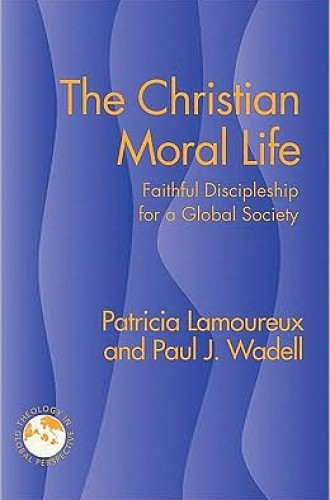The Christian Moral Life, by Patricia Lamoureux and Paul J. Wadell
Patricia Lamoureux and Paul Wadell have written a text in fundamental Catholic moral theology with a creative twist. The topics of several of the chapters are unconventional and fresh, but even when the topic is traditional, the approach contains refreshing elements. The book consistently responds to Vatican II's call to the church to renew moral theology by making it biblically based, centered on Jesus Christ as the model of Christian life and engaged in ecumenical and interreligious dialogue.
The authors explore various interrelated facets of Christian discipleship. The connections between spirituality and morality and between philosophy and theology are woven throughout the text. Lamoureux and Wadell begin with the pattern of call and response, gift and task that characterizes all aspects of faithful discipleship, and they contend that virtue is inseparable from vision—that to live morally we must correct our vision and see as Jesus sees. They argue that virtues are key to a good life and to human flourishing and that virtues are both infused into us as a result of God's grace and acquired habits born of practice.
Read our latest issue or browse back issues.
Christian discipleship is about relationship—with God, with others, with self, with the Earth and with other species. Sin is a violation of all these relationships and an act of self-sabotage. Thus we need a conversion, a radical transformation. We need to put on Christ, to see and think with Christ, to be incorporated into the community of disciples and to take up the mission and ministry of Christ. The reign of God is already here because of the Paschal mystery—the sacrifice and resurrection of Jesus—but because it is not yet complete, it requires our cooperation, our service and our work for justice.
Lamoureux and Wadell critically and clearly explain the categories of Catholic moral theology, such as the types of sin, the kinds of love and the varieties of justice. The sources for their moral theology are scripture, Aristotle, Thomas Aquinas and contemporary scholarship. Although they attend to fundamental questions of meaning and the good life, they do not explicitly develop the concept of natural law. The authors think that the Holy Spirit is guiding the whole church—the faithful, its leaders and its scholars and saints, who should be in fruitful dialogue with one another in guiding the formation of conscience in the contemporary world.
I found the second chapter, on learning to see, and the section "Love for All of God's Creation," in the chapter on love, especially insightful. Lamoureux and Wadell correctly contend that "unless we see rightly we cannot possibly act rightly." They draw on the philosophical essays of Iris Murdoch to illustrate how we humans are masters of illusion, how we distort our vision and delude ourselves about it. They point to Jesus' parables as ways to correct our vision, to overcome "blindsight" and learn to see. The parables have been called blindside storytelling because they subvert our assumptions and perspectives, reorienting us to the new reality of the reign of God. The parable of the rich fool, for example, undermines the logic of prudent planning and replaces it with a call to extravagant generosity. Kingdom economics requires compassion and open-handedness rather than the logical self-interest of capitalist expectations. Perhaps, then, my anxious planning for retirement does not reflect the values of Christian discipleship.
In the brief section on love for creation, the authors argue that we ought to love and value other creatures and species because God loves and values them. Creation is God's handiwork, declared by God to be good. It is good for its own sake, not just to serve human interests. This perspective takes us beyond a stewardship ethic and toward a kinship ethic. It implies, as Lamoureux and Wadell point out, that human interests should not always trump the interests of nonhuman creation, that humanity should be willing to sacrifice on behalf of creation and that we need to cultivate humility in dealing with other species. This too is a different way of seeing that can lead to a transformed way of living.
There are two problems that I see with this fine book, and both are matters of expectations. The subtitle, Faithful Discipleship for a Global Society, might lead one to think that the book seriously addresses moral issues surrounding globalization. The authors do draw on liberation theology in Latin America and Asia, consistently point to the social and justice implications of Christian discipleship and at several points enter into interreligious dialogue with Buddhism, Confucian traditions and Islam, seeking parallels to Christian moral thought. There is, however, no explicit discussion of the cultural and economic dislocations associated with globalization.
Furthermore, one might expect that a book called The Christian Moral Life would address not only ethical models, the meaning of the good life and the mission of Christian discipleship but also a method for making right decisions. This book, however, remains on an abstract level; there is no applied ethics here. No particular moral issues are raised, no cases are explored. Perhaps that would be a different book, or volume two of this book. The Catholic moral tradition, however, has dwelt not only on discipleship, conversion, virtues and conscience but also on moral norms, case-based reasoning and factors in the formation of conscience. It has generally gotten its hands dirty in the nitty-gritty of the good life, in the dilemmas of actually living as disciples. One result of this level of abstraction is that the book is not as engaging and accessible as the authors hope it will be. Lamoureux and Wadell write gracefully and use literature to illustrate some of their theological concepts, but the book begs for more grounding in the concrete lives of Christian disciples.
This is an in-depth introduction to fundamental moral theology that is based on scripture and contemporary scholarship. It persuasively suggests that human happiness and human flourishing are inherently compatible with faithful discipleship and a virtuous life. Well written, creative and insightful, it is likely to cause the serious Christian to pause and meditate on the many dimensions of Christian discipleship that it explores.






